
The Asian Games, also known as Asiad, is a continental multi-sport event held every four years for athletes of Asia. The Games were regulated by Asian Games Federation from the first Games in New Delhi, India in 1951, until the 1978 Games. Since the 1982 Games, they have been organized by the Olympic Council of Asia, after the breakup of the Asian Games Federation. The Games are recognized by the International Olympic Committee and are the second largest multi-sport event after the Olympic Games.

Association football is one of the most-popular sports in India. India hosted the 2017 FIFA U-17 World Cup, the first FIFA event the country hosted; it was called the most successful FIFA U-17 World Cup ever, with a record-breaking attendance of 1,347,133, exceeding China's previous record of 1,230,976 in 1985. India also hosted the 2022 FIFA U-17 Women's World Cup and bid to host the 2019 FIFA U-20 World Cup.

The 1951 Asian Games, officially known as the First Asian Games, was a multi-sport event celebrated in New Delhi, India from 4 to 11 March 1951. The Games received names like First Asiad, 1951 Asiad, and New Dehli 1951. A total of 489 athletes representing 11 Asian National Olympic Committees (NOCs) participated in 57 events from eight sports and discipline. The Games was the successor of the Far Eastern Games and the revival of the Western Asiatic Games. The 1951 Asiad were originally scheduled to be held in 1950, but postponed until 1951 due to delays in preparations. On 13 February 1949, the Asian Games Federation was formally established in Delhi, with Delhi unanimously announced as the first host city of the Asian Games.

The Indian Olympic Association (IOA) or Indian Olympic Committee (IOC) is responsible for selecting athletes to represent India at the Olympic Games, Asian Games and other international sports competitions, and managing Indian teams at these events. It goes with the name of Team India. It also acts as the Indian Commonwealth Games Association, responsible for selecting athletes to represent India at the Commonwealth Games.
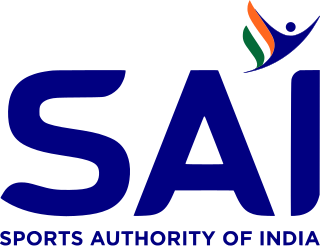
The Sports Authority of India (SAI) was set up in 1984 to carry forward the legacy of the IXth Asian Games held in New Delhi in 1982 under the Department of Sports. SAl has been entrusted with the twin objectives of promoting sports and achieving sporting excellence at the national and international level. SAI, an autonomous body under the Ministry of Youth Affairs and Sports, Government of India, is the Apex National Sports Body of India, for the development of sport in India. SAI has 2 Sports Academies, 12 "SAI Regional Centres" (SRC), 23 "National Centres of Excellence" (NCOE/NCOX), 67 "Sports Training Centres" (STC), 30 Extension Centres of STC and 69 National Sports Talent Content Scheme (NSTC). In addition, SAI also manages Netaji Subhash High Altitude Training Centre, as well as 5 stadiums in New Delhi, such as Jawaharlal Nehru Stadium, Indira Gandhi Arena, Major Dhyan Chand National Stadium, SPM Swimming Pool Complex and Dr. Karni Singh Shooting Range.

Sir Chintaman Dwarakanath DeshmukhICS was an Indian civil servant and the first Indian to be appointed the Governor of the Reserve Bank of India in 1943 by the British Raj authorities. He subsequently served as the Finance Minister in the Union Cabinet (1950–1956). It was during this time that he also became a founding member of the Governing Body of NCAER, the National Council of Applied Economic Research in New Delhi, India's first independent economic policy institute established in 1956 at the behest of Prime Minister Jawaharlal Nehru. After resignation from Union Cabinet he worked as Chairman of UGC (1956–1961). He served as Vice-Chancellor of University of Delhi (1962–67). He was also President of Indian Statistical Institute from 1945 to 1964, Honorary Chairman of National Book Trust (1957–60).
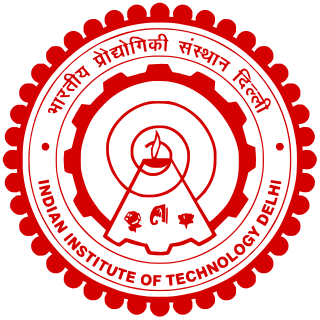
The Indian Institute of Technology Delhi(IIT- Delhi) is a public institute of technology located in Delhi, India. It is one of the 23 Indian Institutes of Technology created to be Centre of Excellence for India's training, research and development in science, engineering and technology.
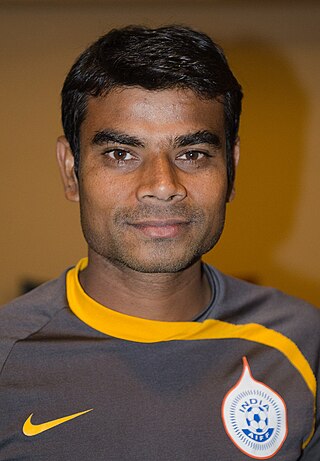
Deepak Kumar Mondal is an Indian former professional footballer who played as a centre-back. A graduate of the Tata Football Academy, An Arjuna Award winner, he was one of India's most prominent right backs for over a decade, earning 47 caps with the India national team. Mondal also played with both the Kolkata giants, East Bengal and Mohun Bagan, spending five years at each club, captaining both of them.
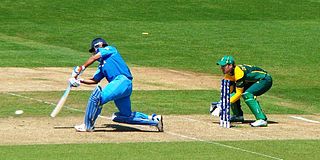
India has a history of sports dating back to the Vedic period, with Western sports having been imported during British rule. Cricket is the most popular spectator sport; it generates the highest television viewership, with the Indian Premier League (IPL) being the most-followed league in the country. Football has also gained popularity, with the Indian Super League (ISL) being the highest level of domestic football, and the national team winning multiple gold medals at the Asian and South Asian Games. Additional football accomplishments include India having reached the Groupstage of the 1960 Olympics, qualified for the 1950 FIFA World Cup, and won the SAFF Championship. Other sports include kabaddi, badminton, tennis, and athletics, with kho-kho becoming the fourth-most viewed sport. India has also had success in field hockey, winning the World Cup and multiple medals in the Olympic Games. Sports such as golf, rugby, boxing, kickboxing, mixed martial arts, motorsport, wrestling, and basketball are featured throughout the country.

Oinam Bembem Devi is an Indian football coach and former footballer from Manipur. In 2017, she was honoured with the Arjuna Award by the Ministry of Youth Affairs and Sports. She was nicknamed the Durga of Indian Football and is currently involved in spreading awareness about Women's football in India.

India is a member of the South Asian Zone of the Olympic Council of Asia, and has participated in the Asian Games ever since their inception in 1951. The Indian Olympic Association was established in 1927 and was recognised by the International Olympic Committee in the same year. It is the country's National Olympic Committee.
Jimmy R. Jagtiani is the founder of the Taekwondo Federation of India.
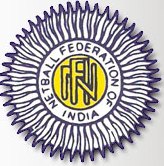
Netball Federation of India (NFI) is the national governing body of Netball in India. NFI is a non-profit, government funded organisation affiliated with the International Netball Federation (INF), the Asian Federation of Netball Association (AFNA) and the Indian Olympic Association (IOA) and recognised by the Ministry of Youth Affairs and Sports. NFI was established in 1978 to standardise rules and regulations and to promote and develop the growth of netball in India. NFI operates all the Indian national representative netball sides, including the India national netball team and youth sides as well. NFI is also responsible for organising and hosting netball tournaments within India and scheduling the home international fixtures. Vagish Pathak is the current president of the organisation.

The Pradhan Mantri Rashtriya Bal Puraskar, formerly called the National Child Award for Exceptional Achievement, is India’s highest civilian honour for children, awarded annually by the Ministry of Women and Child Development.
Prasun Banerjee is an Indian former professional footballer and politician who is serving as an MP in the Lok Sabha from Howrah. He is an Arjuna Award winner (1979). Younger brother of the Pradip Kumar Banerjee, Prasun had also captained the India national football team in international tournaments.
Shiv Kumar Sarin is an Indian physician; an outstanding hepatologist, gastroenterologist, translational scientist, accomplished researcher, mentor, and a gifted teacher. Under the aegis of Delhi Govt., he set-up the Institute of Liver and Biliary Sciences (ILBS); the largest liver hospital and a deemed Liver University, and a WHO Centre. He is a prolific researcher with an H-index of 116. He has received Shanti Swarup Bhatnagar Prize, The World Academy of Science Prize, and Padma Bhushan in 2007. He served as Chairman Board of Governors of Medical Council of India and shaped the New Medical Education Vision, including NEET and NEXT exams. He is a leader in science and served as the President of the Asian Pacific Association for study of Liver and is currently the President of the National Academy of Medical Sciences (NAMS) of India (2021-2024).
The Softball Association of India (SBAI) is the governing body for softball in India. Legally, it is a non-profit association registered under the Societies Registration Act, 1860.

The Tenpin Bowling Federation (India), abbreviated to TBFI, is the national sports federation for ten-pin bowling in India. Legally, it is a non-profit association registered under the Societies Registration Act, 1860. The Bowling Federation of India was founded in 1975. The organization was renamed to the Tenpin Bowling Federation (India) in 2007.

The India Taekwondo (IT) replaced Taekwondo Federation of India (TFI) as the national governing body for Taekwondo in India on confirmation from World Taekwondo on 9th July 2019.

The Karate India Organisation(KIO) replaced Karate Association of India(KAI) as the national governing body for karate in India on confirmation from World Karate Federation (WKF) on 15 November 2021.
















